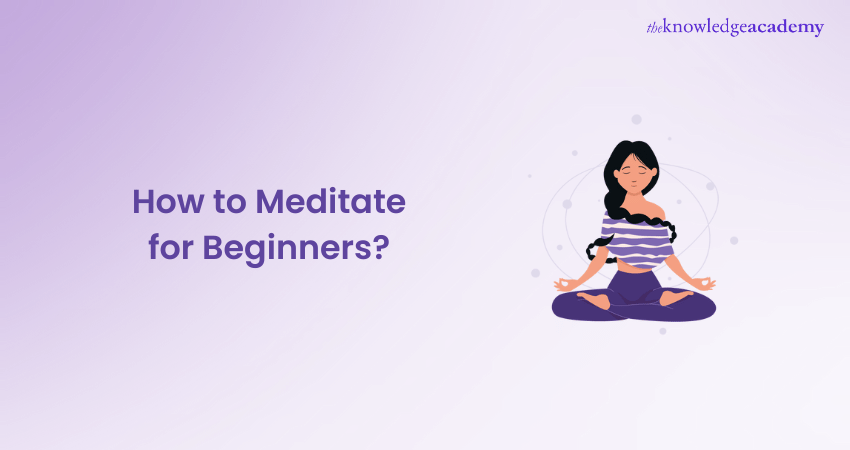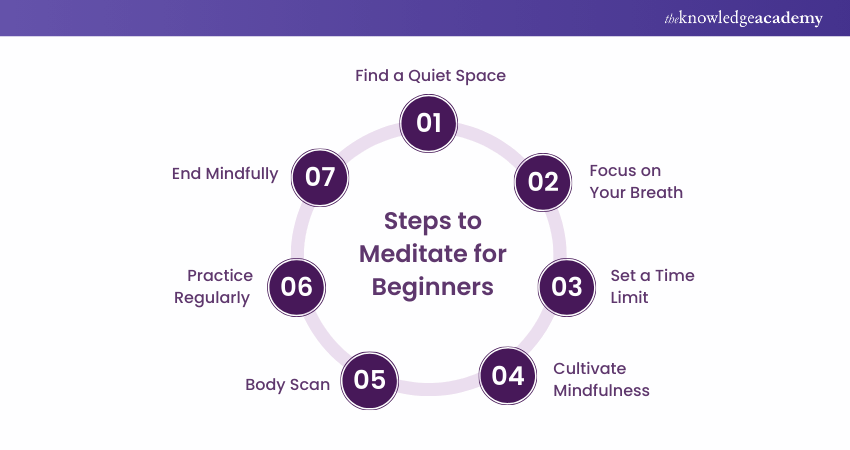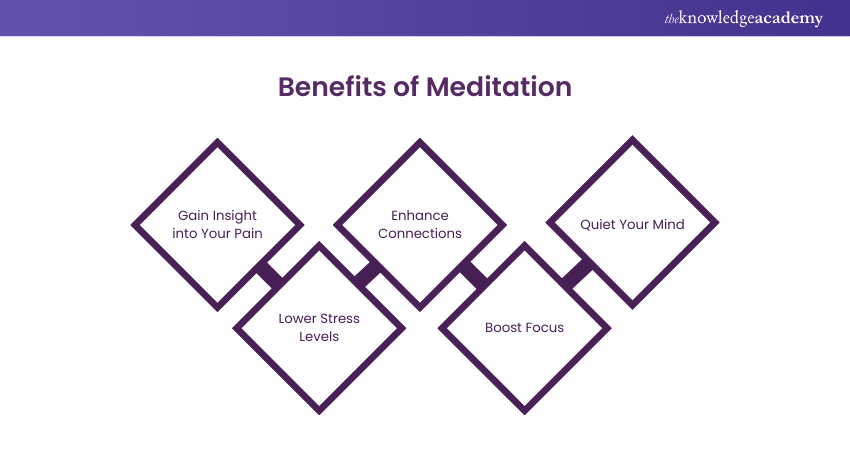We may not have the course you’re looking for. If you enquire or give us a call on 01344203999 and speak to our training experts, we may still be able to help with your training requirements.
Training Outcomes Within Your Budget!
We ensure quality, budget-alignment, and timely delivery by our expert instructors.

Would you like an escape from the chaos of your day to day life? Get away from the bizarreness of it all? What if you could take that journey for free? Take a journey simply with the power of your mind! You can actually do so with Meditation. You might be wondering, “How to Start Meditation for Beginners?”
Do not worry this blog on How to Meditate for Beginners will walk you through everything you need to know to start this journey. In the blog you will learn how to meditate, get an understanding of its benefits and some tips you can keep in mind. Read along to start your journey with mindfulness meditation for beginners today!
Table of Contents
1) What is Meditation?
2) How to Meditate: For Beginners
3) Benefits of Learning How to Meditate
4) How to Cultivate Mindfulness as a Beginner?
5) Tips for Meditation
6) The Experience of Meditation
7) How to Stay Consistent with Meditation?
8) Conclusion
What is Meditation?
Meditation is a contemplative practice with roots in various spiritual and philosophical traditions. It involves training the mind to achieve heightened awareness, focus, and inner tranquillity. Practitioners often engage in specific techniques, such as focused attention on the breath, a mantra, or an object, to cultivate a calm and clear mental state.
How to Meditate: For Beginners
Listed below the steps that to follow if you want to Meditate. Let's have a detailed look at each one of them:

Find a Quiet Space
Selecting a serene environment is pivotal for a fruitful Meditation session. Opt for a tranquil space with minimal disturbances. Whether you're seated on a chair or cushion, ensure comfort and stability. This choice of surroundings forms a base for a truly fruitful and rewarding Meditation experience.
Focus on Your Breath
Close your eyes, creating a space for introspection. Shift your focus inward, gently directing your attention to the rhythmic dance of your breath. Also, observe the natural ebb and flow of inhalation and exhalation, allowing each breath to serve as a steady anchor, grounding you in the serenity of the present moment.
Set a Time Limit
When initiating your Meditation journey, start with a feasible time commitment, ideally 5-10 minutes. This initial duration provides a gentle introduction, allowing you to establish a consistent practice without overwhelming yourself. As your Meditation practice evolves and becomes more familiar, consider extending the duration incrementally.
Cultivate Mindfulness
In the practice of mindfulness, cultivate an open, non-judgmental awareness of your thoughts, sensations, and surrounding sounds. If your mind begins to wander, understand that this is normal. Try to guide your focus back to the rhythmic flow of your breath or the immediate sensations of the present moment.
Body Scan
During a body scan, systematically direct your attention to different regions of your body. Begin with areas like your toes and work your way up, paying keen attention to each part. As you focus, intentionally release any tension you notice, allowing a sense of ease and relaxation to permeate. This method promotes mental relaxation and lets your physical body relax as well.
Take charge of your health with our Healthy Lifestyles Training. Begin your journey to a vibrant life now!
Practice regularly
Consistency lies at the core of a fulfilling Meditation journey. Cultivate a daily routine that becomes a cherished ritual. The cumulative benefits of regular practice gradually unfold, creating a harmonious rhythm between your inner self and the external world.
As you commit to this habit, the art of Meditation becomes increasingly natural. Moreover, you will unveil its profound rewards in the form of heightened awareness, mental clarity, and an enduring sense of well-being.
End mindfully
As your Meditation session concludes, gently open your eyes, allowing the transition from stillness to the outer world to unfold gradually. Take a mindful pause to observe your surroundings, appreciating the details often overlooked.
Carry the serene atmosphere and heightened awareness cultivated during Meditation into the rhythm of your daily life. Let this sense of calm guide your actions, fostering a seamless integration of mindfulness beyond the Meditation session.
Discover the power to shape a healthy and vibrant life with our Active and Healthy Lifestyles Training. Join now!
Benefits of Learning How to Meditate
Meditation may not be a cure-all, but it can create much-needed space in your life, helping you make better choices for yourself, your family, and your community. All you need for a successful meditation practice is a little patience, some self-kindness, and a comfortable place to sit.
Meditation offers numerous far-reaching and long-lasting benefits, and the best part is that you don't need any special equipment or an expensive membership to get started. Here are five compelling ways meditation can benefit you:

Gain Insight Into Your Pain
Meditation helps you become more aware of both physical and emotional pain. You observe your thoughts and how you feel without judging it, you allow yourself to uncover the root causes of your pain. This helps develop healthier coping strategies. This awareness fosters a deeper understanding of yourself.
Lower Stress Levels
A key benefit of meditation is its ability to reduce stress. Regular practice decreases the production of cortisol, promoting a sense of calm and relaxation. This stress reduction improves overall health and lowers the risk of stress-related illnesses.
Enhance Connections
Meditation cultivates empathy and compassion for yourself and others. By fostering a non-judgmental and kind attitude, you can improve your relationships and connect more deeply with those around you, leading to more meaningful and fulfilling interactions.
Boost Focus
Meditation trains your mind to concentrate and stay present. Regular practice enhances your ability to focus on tasks, increasing productivity and efficiency. Better focus also helps you manage distractions and stay aligned with your goals.
Quiet Your Mind
The constant stream of thoughts, or "mental chatter," can be overwhelming. Meditation calms this chatter, allowing you to experience inner peace and clarity. By quieting your mind, you can reduce anxiety and create a more serene mental space.
Discover the different Types of Meditation to enhance your mindfulness and well-being. Explore today!
How to Cultivate Mindfulness as a Beginner?
As a beginner, cultivating mindfulness can transform your daily life, helping you make thoughtful decisions and embrace inner peace.
Start by creating visual cues around your space
If you plan to meditate or practice yoga, place your mat or cushion in plain sight, making it impossible to ignore. These gentle reminders nudge you to pause and engage in mindful practices.
Keep your reminders fresh
Sticky notes with mindfulness prompts might work initially, but your autopilot brain will quickly adapt. Refresh these notes regularly, infusing them with variety and humour to keep your intentional brain engaged.
Develop simple "If this, then that" patterns
For instance, "If you open your laptop, take a deep breath," or "If you hear your phone ring, pause before answering." These small actions help train your mind to shift into mindfulness effortlessly.
Note: the journey to mindfulness takes practice and patience. Each deliberate action strengthens your intentional brain, fostering a deeper connection with yourself and the present moment.
Combine the power of meditation and physical health, take up a Yoga Course to accomplish your wellness goals – Sign up now!
Tips for Meditation
Meditation can create a sanctuary of calm in your busy life and act as your gateway to wellbeing. Here are some tips to help you get started on this transformative journey:
1) Create a Dedicated Space: Find a quiet corner in your home and make it your meditation haven. Add a cushion, a blanket, or anything that makes you feel comfortable and serene.
2) Set a Regular Time: Consistency is key. Choose a time that works best for you, whether it's first thing in the morning to start your day or in the evening to wind down.
3) Start Small: You can begin with just a few minutes each day. Gradually increase the amount of time you meditate as you get more comfortable with the practice.
4) Focus on Your Breath: Every breath is a powerful anchor. Pay attention to the sensation of each inhale and exhale, letting it guide you into a state of calm and presence.
5) Be Kind to Yourself: Meditation is not about emptying your mind. It's natural for thoughts to arise. When they do, try to gently bring your focus back to your breath without judgment.
6) Use Guided Meditations: If you're new to meditation, guided sessions can be incredibly helpful. They provide structure and keep you focused.
7) Practice Patience: Like any new habit, meditation takes time to develop. Be patient with yourself and appreciate the journey.
The Experience of Meditation
When you meditate, expect your mind to wander—it's natural. Gently refocus on your breath each time. You might feel like nothing is happening, but that's okay; meditation is valuable for your mind. Emotions may arise, from impatience to sadness, as your mind adjusts to stillness.
Allow these feelings without pushing them away, and observe their physical sensations. Fidgeting is common; notice it, let it go, and return to your breath. Avoid trying too hard; approach meditation with a relaxed attitude, allowing your mind to settle naturally. Understanding these experiences helps make meditation a rewarding daily practice.
How to Stay Consistent with Meditation?
As you learn to meditate, you'll face challenges, but you can always return to the basics and tips to stay on track. The key to maintaining a consistent practice is knowing your intention. Why do you want to meditate? Whether it's to feel happier, calmer, more focused, or less stressed, being clear about your goals helps create the right mindset. When boredom, restlessness, or doubt arise, remind yourself of your intention. This motivation can keep you committed.
For beginners, it's essential to remember there's no pressure to "get it right." Simply showing up for yourself is a success. Even if you miss sessions and doubt your ability to meditate, recognize these as just thoughts. Notice them, let them go, and continue being kind to your mind.
Conclusion
Starting your journey with meditation may feel underwhelming at first, but with practice, you will see that it is a fruitful practice. This blog on How to Meditate for Beginners, helps you start your journey well informed and ready. It is recommended to start off with a few beginners mindfulness meditation apps if you have difficulty starting off. But you are free to practice independently once you get the hang of it.
Learn Meditation techniques to manage and reduce stress effectively with our Meditation Couse! - Sign up now!
Frequently Asked Questions

Focus on your breath, the sensation of each inhale and exhale. If your mind wanders, gently return your focus to your breath.

Daily practice helps build a habit and provides the most benefits, but even a few times a week is beneficial.

The Knowledge Academy takes global learning to new heights, offering over 30,000 online courses across 490+ locations in 220 countries. This expansive reach ensures accessibility and convenience for learners worldwide.
Alongside our diverse Online Course Catalogue, encompassing 17 major categories, we go the extra mile by providing a plethora of free educational Online Resources like News updates, blogs, videos, webinars, and interview questions. Tailoring learning experiences further, professionals can maximise value with customisable Course Bundles of TKA.

The Knowledge Academy’s Knowledge Pass, a prepaid voucher, adds another layer of flexibility, allowing course bookings over a 12-month period. Join us on a journey where education knows no bounds.

The Knowledge Academy offers various Healthy Lifestyles Training including Life coach, Yoga, Nutrition and Fitness etc. These courses cater to different skill levels, providing comprehensive insights into 5 Ways to WellBeing.
Our Health & Safety blogs covers a range of topics related to Meditation, offering valuable resources, best practices, and industry insights. Whether you are a beginner or looking to advance your Health & Safety skills, The Knowledge Academy's diverse courses and informative blogs have you covered.
Upcoming Health & Safety Resources Batches & Dates
Date
 Life Coach Training
Life Coach Training
Fri 14th Feb 2025
Fri 11th Apr 2025
Fri 13th Jun 2025
Fri 15th Aug 2025
Fri 10th Oct 2025
Fri 12th Dec 2025







 Top Rated Course
Top Rated Course



 If you wish to make any changes to your course, please
If you wish to make any changes to your course, please


